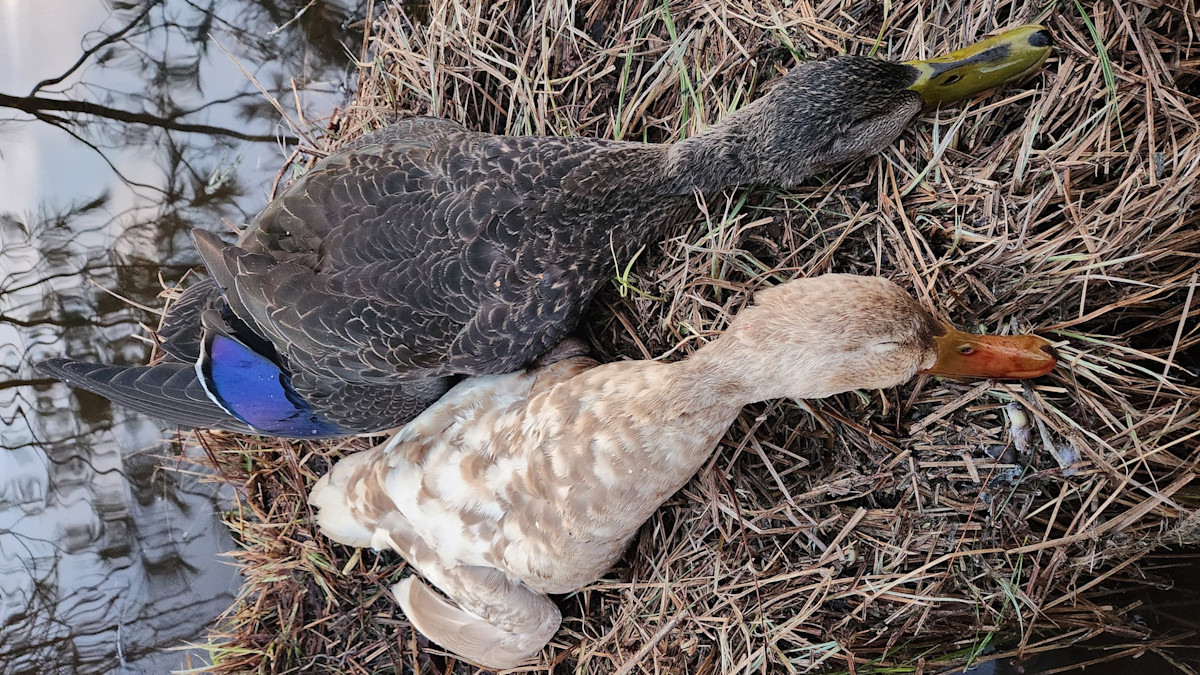
One shot rang out, causing a temporary disruption to the symphony of the marsh. Its echo was preceded by a plop in the open water, spraying the nearby ice rafts in its proclamation. In the red morning light, Massachusetts hunter Mike Wec thought he had shot a hen mallard. But it wasn’t until he waded out to the floating figure that he realized it was...Well, what was it exactly?
Wec carefully examined it further, stretching out its delicate white wings that nearly glowed in the contrast of the dark water. Its contour feathers were composed of various shades of white and blonde—some as dark as the winter cattails beyond his decoy spread.

“I remember thinking it had to be a leucistic mallard or game-farm mallard,” Wec said.
Leucism is a condition of unusual coloration in animals, often confused with albinism. It results in partial loss of pigmentation, producing birds with all white plumage or just a few white feathers. Unlike albino birds, leucistic birds typically have dark eyes and normal vision.
Later that evening, curious about the duck's genetic makeup, Wec's wife discovered Ducks Unlimited (DU) and the University of Texas at El Paso’s (UTEP) duckDNA project after a quick Google search. He described the process as straightforward, with duckDNA sending an email response and an official sample kit in quick order.
Wec received the duckDNA results this spring, revealing the duck’s surprising lineage. It was a 100% pure, wild American Black Duck female—the first genetically documented leucistic individual of its species.

duckDNA
The duckDNA project is a new citizen-science initiative from Ducks Unlimited and its partnership with one of the world’s leading waterfowl geneticists, Dr. Philip Lavretsky, from the University of Texas at El Paso. Once enrolled in the project, waterfowl hunters are asked to provide tissue samples from harvested ducks for genetic analysis.
Until now, both hunters and waterfowl scientists have only been able to speculate on the genetics of these pale-winged specters like Mike Wec’s, often believing them to be leucistic mallards or game-farm mallard hybrids. But thanks to duckDNA, there’s no more guessing.
“This is a huge showcase of what duckDNA provides to hunters and scientists in cooperation at a level we've never had before,” Lavretsky declared. “No more assumptions and biases—there is no hiding DNA.”

duckDNA Year One Results
In its first season, duckDNA enlisted 309 participants from 47 states, collecting 721 samples. Genetic data from 15 different duck species was detected, including the 19 unique hybrid combinations.
Key hybrids documented include:
- Wild Mallard x Game-Farm Mallard
- Wild Mallard x American Black Duck
- Wild Mallard x American Wigeon
- Wild Mallard x Gadwall (Brewer’s ducks: male gadwall and female mallard)
- Wild Mallard x Wood Duck
- Florida Mottled Duck x Wild Mallard
- Muscovy x Wild Mallard
- Domestic Goose x Canada Goose
How duckDNA Works
Step 1. Apply Hunters are encouraged to apply at www.duckDNA.com. Researchers will select approximately 750 participants for the 2024–2025 season. If selected, hunters will receive instructions to create a duckDNA account.
Step 2. Go Hunting Selected hunters will receive a duckDNA sample kit and collect tissue samples from the ducks they harvest. The study is prioritizing mallards, but hunters may submit any duck of interest.
Step 3. Log and Collect Hunters go to www.duckdna.com and enter information associated with each sample into their personalized duckDNA portal.
Step 4. Return Samples Hunters return their samples to the Lavretsky Lab at UTEP via pre-paid mail for analysis.
Step 5. Get Results Hunters will receive the genetic profiles of their submitted ducks directly to their personalized duckDNA account.
Applications for year two of this project will begin later this summer. Hunters can click here to be added to a list for project updates.

The Purpose of duckDNA
The field of conservation genetics has expanded rapidly in recent years, enabling more detailed studies of how genes and genetic processes may affect wildlife populations. For example, research from the University of Texas at El Paso has revealed that over a century of game-farm mallard releases in the Atlantic Flyway has led to widespread hybridization with wild mallards. Other studies have uncovered potential differences in behavioral, physiological, and ecological traits between game-farm hybrids and pure wild mallards, which may impact reproduction, movements, and duck distributions across their range.
Data gathered from duckDNA will be used to assess the westward expansion of game-farm hybrids in North America while helping answer other questions about the role of genetics in waterfowl population dynamics and conservation.
“Waterfowlers have a proven history of dedication to conservation, research and the health of our duck populations,” Lavretsky said. “Scientists have spent decades studying bird populations and new genetic techniques are opening an entirely new landscape of discovery. duckDNA is an exciting way for hunters to take an active role in ensuring robust populations of mallards for generations to come.”

A Commitment to Conservation
Ducks Unlimited has a long history of advancing waterfowl and wetland conservation through scientific partnerships. The new duckDNA project reflects their ongoing commitment to push conservation forward in a changing world.
“We’re thrilled to work with Dr. Lavretsky to bring duck hunters into the scientific process through the innovative project of duckDNA. They will be providing information that DU and our partners will use to guide waterfowl management and conservation for all hunters in North America,” said Dr. Mike Brasher, DU’s senior waterfowl scientist.
By involving hunters directly in scientific research, Ducks Unlimited continues to foster a deeper connection between sportsmen and women, scientists, and the waterfowl and habitats they are so invested in conserving. Partnerships are how DU gets things done, and only together can we ensure the skies are full of waterfowl today, tomorrow, and forever.
Nathan Ratchford is Ducks Unlimited's Conservation Communications Coordinator. To contact him regarding duckDNA, you can email him at nratchford@ducks.org.





